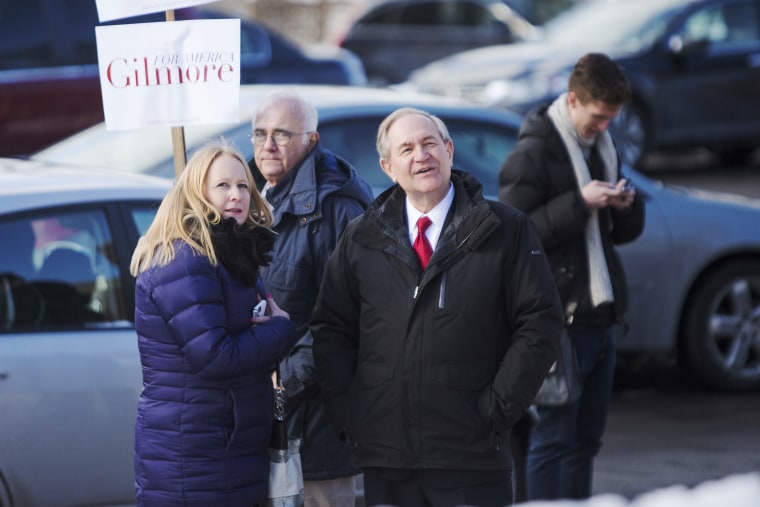He was the one presidential candidate who observers routinely forgot about. He was left out of some of the polls; he was excluded from most of the debates; and he didn't really have any money.
And as of this afternoon, former Virginia Gov. Jim Gilmore's Republican candidacy has apparently come to an end. The Washington Examiner published his official statement wrapping up his campaign.
"My campaign was intended to offer the gubernatorial experience, with the track record of a true conservative, experienced in national security, to unite the party." Gilmore said, "My goal was to focus on the importance of this election as a real turning point, and to emphasize the dangers of continuing on a road that will further undermine America's economy and weaken our national security." "Nonetheless, I will continue to express my concerns about the dangers of electing someone who has pledged to continue Obama's disastrous policies," Gilmore said. "And, I will continue to do everything I can to ensure that our next President is a free enterprise Republican who will restore our nation to greatness and keep our citizens safe."
To put it mildly, the Virginia Republican was never in contention. A few days before the Iowa caucuses, he told a radio audience, "If I get one vote, frankly, in Iowa, I'll consider it a victory." Gilmore ended up with 12 votes -- the basis for a moral victory, if little else. He then finished 12th in New Hampshire, picking up fewer votes than a couple of candidates who'd already dropped out.
This was Gilmore's second presidential campaign, following a brief stint in 2007-2008. He quit soon after launching to instead run for the U.S. Senate in his home state. (He lost by over 30 points.)
Note, last year, Gilmore argued, "I bring to the table experience that others don't have," which was not an unreasonable boast. He was a governor of Virginia; he served as an RNC chairman; and he was one of the only candidates to run in this cycle with military experience.
Indeed, with Gilmore's departure, the number of military veterans in the presidential race has now reached zero.
The only thing I'm not clear on is why Gilmore is quitting now. At the risk of being unkind, his campaign didn't really exist in any tangible way, so there's no reason he couldn't just continue to be a candidate indefinitely. It's not as if the former governor is suddenly less competitive now than he was last week, last month, or last year.
Regardless of his motivation, Gilmore's decision now officially shrinks the GOP's 2016 field to six remaining candidates: Donald Trump, Ted Cruz, Jeb Bush, Marco Rubio, John Kasich, and Ben Carson. When Gilmore kicked off his candidacy in July, the field stood at 17 people.
Finally, there was a fair amount of talk in the not-too-distant past about the Republican Party's "deep bench" of qualified governors. At one point, nine current or former GOP governors entered the race for the White House. Seven of them -- Rick Perry, Scott Walker, Bobby Jindal, George Pataki, Mike Huckabee, Chris Christie, and Gilmore -- have now quit, most departing before actual voting even began.
